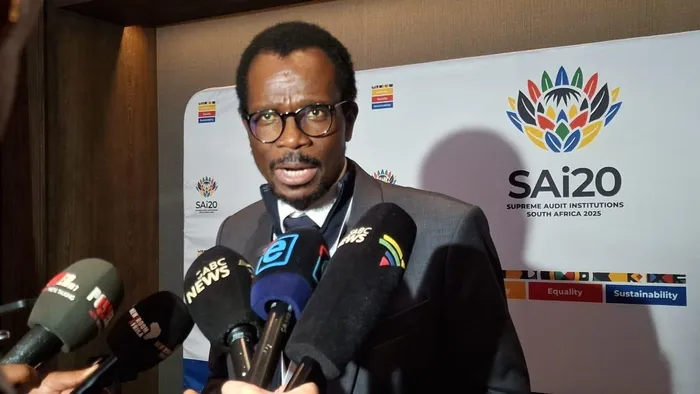
Dr David Masondo, Deputy Minister of Finance, said that the Summit of the supreme audit institutions of the G20 nations (SAI)20 was focused on two fundamental enablers of inclusive economic development, namely infrastructure and skills.
Image: Timothy Bernard / Independent Newspapers
The National Treasury has called for more cooperation among the Group of 20 (G20) countries for the benefit of low-income economies on the back of escalating geopolitical tensions.
This call comes amid concerns that ongoing conflicts—particularly in the Middle East, a crucial region for global oil supply—and heightened trade tensions between the United States and China are casting a long shadow over the global economy.
Speaking at the opening day of the Supreme Audit Institutions of the G20 nations (SAI20) on Tuesday, deputy finance minister David Masondo reflected on the recent G20 finance meetings, where the global economic landscape was painted with uncertainty due to geopolitical tensions and trade fragmentation.
Masondo said the G20 had to play a central role in fostering stability and strategic direction during this period of global economic turbulence.
“The G20 Finance Ministers also acknowledged that low-income countries would be the most severely affected by geopolitical tensions, trade fragmentation; and that these unfortunate developments would not bode well for safeguarding growth and financial stability,” he said.
Masondo said that the Summit was focused on infrastructure and skills as the two fundamental enablers of inclusive economic development.
“Infrastructure is one of the themes that SAI20 has chosen; and this could not be more apt. Infrastructure is a key enabler of economic development and employment creation and delivering services to citizens,” he said.
“Mindful of this, as the South African sovereign, we have committed significant investments towards infrastructure development. We have the most ambitious infrastructure development programmes ever undertaken in our country.”
Masondo said that this was necessitated by their desire to grow the economy through increasing the role of the private sector in the supply of electricity, freight logistics, telecommunications and water.
“Given the constrained fiscal constraints and the State-Owned Enterprises' balance sheets, we need to mobilise private capital to finance the infrastructure,” Masondo said.
“Supreme audit institutions play the crucial role that they do in auditing government; they are therefore a key enabler of their countries’ abilities to deliver on their infrastructure development goals, in the same way that our own supreme audit institution, the Auditor-General of South Africa, plays the key role that it does in enabling us to realise our infrastructure development aspirations.”
Masondo said that the audit reports helped in examining the controls that needed to be in place to ensure the efficient and effective deployment of resources towards the infrastructure delivery programmes.
Auditor-General of South Africa (AGSA), Tsakani Maluleke, underscored the critical role the Group of Twenty (G20) plays in navigating global challenges, stating that the platform emerged from significant crises that have shaken economies worldwide.
From the wake of the 2008 global recession to the viral disruption of the Covid-19 pandemic in 2020, Maluleke said the G20 represented a collective effort by both developing and developed nations to foster solidarity and collaborative problem-solving.
Maluleke explained that the G20 included countries representing 85% of the global gross domestic product (GDP), more than 75% of international trade, and approximately two-thirds of the world’s population.
She said this remarkable assembly of nations served as a pivotal platform through which leaders can unite to grapple with pressing issues that affect global stability and prosperity.
Maluleke added that the establishment of the SAI20 naturally raised questions about the relevance of an Engagement Group of Supreme Audit Institutions and whether there was a legitimate role for them in the G20 programme.
Maluleke said that SAIs were not only good for reporting after the fact on historical information, but also serve as indispensable sources of strategic foresight and insight for their nations to inform strategies and commitments.
“What we have managed to do in our analysis of the two themes of accelerating efforts to unlock and leverage public infrastructure funding for equality, sustainable growth and bringing improvement to the lives of citizens and undertaking collaborative and integrative efforts towards bridging the skills gap for a future-ready workforce was to demonstrate that there is indeed a legitimate role for SAIs in deliberating on matters of global socioeconomic development,” she said.
BUSINESS REPORT